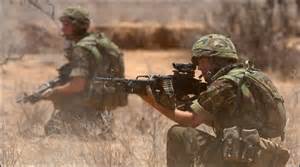The class-divided nature of the British Army is made very clear in the draconian treatment of fifteen soldiers jailed for staging a sit-in protest directed at senior officers in the Yorkshire Regiment (see article posted on BBC online at Yorkshire Regiment soldiers jailed for sit-in protest). Alan Boylan (RCN) is a former serviceman in the British Army and comments below on how such situations can develop.

As an ex servicemen I was remind of my time in the forces being led by muppets. Troops don’t often get pissed off but usually when they do it’s around some incident that could be quite minor but affects them and their morale.
I remember a couple of times when I was involved on a similar but not uncommon happening. We had just come off a weeks squadron exercise and everyone was knackered. We were just heading to our barracks when the station alarm went off that was us back into a station exercise for 3 days. Then the CO wasn’t happy with the performance of the squadron and kept us out an extra 2 days. I have never been so tired – or pissed off.
After we returned to barracks the very next day at work was a belter. We faced 22 charges in one day from outright disobedience to being late or drunk for parade. What was unusual about that? Well the squadron had been charge free for a year until that day. In fact it had only charges for lateness.
Things were awful for about 3 months after this. We felt aggrieved and any little thing pissed us off dissent was verbal and morale dipped, among the ranks below sergeant. This feeling died down slowly and eventually when we got a break. After a few weeks of normal routine in camp the troops felt rested.
Troops don’t have many mechanisms to show their disapproval/ You rely on savvy NCOs to spot trouble, deal with it sensibly and to talk on behalf of the troops – and older soldiers among the ranks too talk out on behalf off their younger colleagues. No servicemen do these things lightly. Punishments are severe. Even today their is no avenue apart from the padre to complain to – or chance your arm with your officers.
I think this NCO was leading tired troops and they had probably had enough of being used and abused and just needed a break. Remember he has lost his job and his pension.
He would be fully aware he would be tagged a ringleader and risked all for his men. Whilst it may not have been a life threatening situation they were in, he was looking after the welfare of his troops – something drummed into troops from their recruit days. Your mates and men eat before you and your buddy is the man you look after. A huge part of service life is to make sure your buddy is okay before you deal with yourself.
I think if the services had union rights of complaint, or an independent advocate, these would make their lives so much better. The forces have always dodged this issue of advocate rights for troops – but it is something that could have averted the NCO’s loss of position and pension and perhaps allowed fairer treatment to the men.
